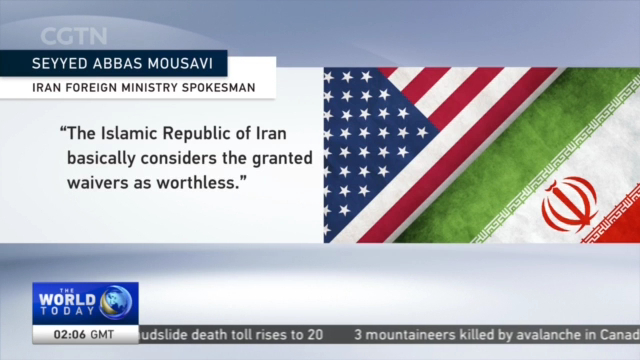
11:17, 23-Apr-2019
US Sanctions on Iran: Waivers for buyers of Iranian oil set to end May 2
Updated
11:10, 26-Apr-2019
02:29

The US has decided not to re-issue waivers on Iran oil imports when they expire in early May sending oil prices to a 6-month high. Tehran has strongly opposed the move. Our correspondent Nathan King has the story.
It's part of an effort to ramp up pressure on Tehran after the unilateral withdrawal by Washington from the Iran nuclear deal. The U.S. administration wants to stop all Iranian oil exports.
MIKE POMPEO US SECRETARY OF STATE "Today, I am announcing that we will no longer grant any exemptions. We're going to zero - going to zero across the board. We will continue to enforce sanctions and monitor compliance. Any nation or entity interacting with Iran should do its diligence and err on the side of caution. The risks are simply not going to be worth the benefits."
The spokesman for Iran's foreign ministry called the sanctions 'illegal,' and said: "The Islamic Republic of Iran basically considers the granted waivers as worthless."
According to Pompeo, Iran's oil revenue used to be 50 billion dollars year. Sanctions have cut 10 billion since the U.S. imposed sanctions last November.
But, because Washington unilaterally withdrew from the Iran nuclear deal while Tehran was in full compliance, there is little appetite from other nations to comply with U.S. demands. Turkey has already expressed its opposition, as has Iraq and China-the biggest buyer of Iranian oil.
GEN SHUANG, SPOKESPERSON CHINESE MINISTRY OF FOREIGN AFFAIRS "China has consistently opposed the U.S. implementation of unilateral sanctions and the so-called 'long-arm jurisdiction.' The cooperation between China and Iran is open, transparent, reasonable and legitimate, and deserves to be respected."
Whether Washington will follow through with its threat remains to be seen. Several of the nations that rely on Iranian oil are U.S. allies. Italy, Greece and Turkey are all members of NATO, Japan and South Korea key U.S. allies in the Asia Pacific.
Washington says energy supply disruptions can be solved by increasing supply from Saudi Arabia - Iran's main regional adversary - and also from other oil producing nations.
NATHAN KING WASHINGTON "But for many countries, it's not only about Iran, it's about stand up against US when it comes to energy security, issues of global governance and also the policy here from the White house about diplomatic and economic war fair when it comes to Iran. Nathan King, CGTN, at the White House."

SITEMAP
Copyright © 2018 CGTN. Beijing ICP prepared NO.16065310-3
Copyright © 2018 CGTN. Beijing ICP prepared NO.16065310-3